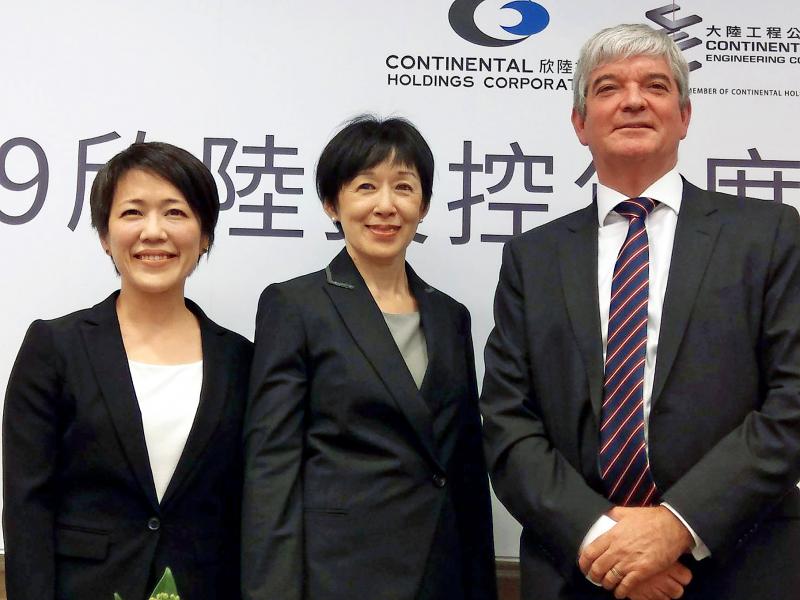Continental Holdings Corp (CHC, 欣陸投控) yesterday said it would consider selling its stakes in four hotels in Taiwan and abroad, but would not accept low-ball offers when offloading investments.
The Taipei-based conglomerate owns the site of the newly launched Humble Boutique Hotel (寒居酒店) in Taipei’s Zhongshan District (中山) and 55 percent stakes in both the Capri by Fraser2 in Kuala Lumpur and the upcoming Line Hotel in San Francisco. It also controls a 35 percent stake in Hotel Nikko Kaohsiung, which is to open next year.
CHC would consider selling the four properties, whose value could bring the company NT$22 billion (US$745.13 million), CHC chief executive officer Cindy Chang (張方欣) told an online investors’ conference.

Photo: CNA
The group would negotiate with serious buyers, but is unwilling to consider unfair evaluations, she said, adding that CHC is ready to pursue stable rental incomes over the long term.
The COVID-19 pandemic has wreaked havoc on hotel operations worldwide, but the company reported that net income last quarter increased more than twofold to NT$1.24 billion, or earnings per share of NT$1.5.
Revenue in the first quarter rose 57.8 percent to NT$10.02 billion year-on-year with contributions from all three subsidiaries: Continental Engineering Corp (大陸工程), Continental Development Corp (CDC, 大陸建設) and HDEC Corp (欣達環工), CHC said in a statement.
CDC, the property development arm, contributed more than 60 percent of the group’s total earnings, thanks to sales of luxury housing in Taipei’s Xinyi District (信義), it said.
In the second half of the year, CDC is expected to post a profit of NT$2.84 billion from new housing units in New Taipei City’s Sindian District (新店), it said, adding that the newly opened Humble Boutique Hotel would also begin to contribute rental income.
Government measures aimed at curbing property speculation might postpone transactions in the short term, as prospective buyers might need more time to assimilate the changes, Chang said.
However, people in need of housing would press ahead with purchases after calm returns to the market, Chang said, adding that CDC’s projects are aimed at buyers with real demand.
Next year, CDC is expected to post a profit of NT$2.39 billion from new housing in Taipei’s Shilin District (士林) and NT$2.23 billion from projects in Zhongshan District, she said.
A residential complex in Kaohsiung might generate NT$3.51 billion in sales, Chang said.

CAUTIOUS RECOVERY: While the manufacturing sector returned to growth amid the US-China trade truce, firms remain wary as uncertainty clouds the outlook, the CIER said The local manufacturing sector returned to expansion last month, as the official purchasing managers’ index (PMI) rose 2.1 points to 51.0, driven by a temporary easing in US-China trade tensions, the Chung-Hua Institution for Economic Research (CIER, 中華經濟研究院) said yesterday. The PMI gauges the health of the manufacturing industry, with readings above 50 indicating expansion and those below 50 signaling contraction. “Firms are not as pessimistic as they were in April, but they remain far from optimistic,” CIER president Lien Hsien-ming (連賢明) said at a news conference. The full impact of US tariff decisions is unlikely to become clear until later this month

Popular vape brands such as Geek Bar might get more expensive in the US — if you can find them at all. Shipments of vapes from China to the US ground to a near halt last month from a year ago, official data showed, hit by US President Donald Trump’s tariffs and a crackdown on unauthorized e-cigarettes in the world’s biggest market for smoking alternatives. That includes Geek Bar, a brand of flavored vapes that is not authorized to sell in the US, but which had been widely available due to porous import controls. One retailer, who asked not to be named, because

CHIP DUTIES: TSMC said it voiced its concerns to Washington about tariffs, telling the US commerce department that it wants ‘fair treatment’ to protect its competitiveness Taiwan Semiconductor Manufacturing Co (TSMC, 台積電) yesterday reiterated robust business prospects for this year as strong artificial intelligence (AI) chip demand from Nvidia Corp and other customers would absorb the impacts of US tariffs. “The impact of tariffs would be indirect, as the custom tax is the importers’ responsibility, not the exporters,” TSMC chairman and chief executive officer C.C. Wei (魏哲家) said at the chipmaker’s annual shareholders’ meeting in Hsinchu City. TSMC’s business could be affected if people become reluctant to buy electronics due to inflated prices, Wei said. In addition, the chipmaker has voiced its concern to the US Department of Commerce

STILL LOADED: Last year’s richest person, Quanta Computer Inc chairman Barry Lam, dropped to second place despite an 8 percent increase in his wealth to US$12.6 billion Staff writer, with CNA Daniel Tsai (蔡明忠) and Richard Tsai (蔡明興), the brothers who run Fubon Group (富邦集團), topped the Forbes list of Taiwan’s 50 richest people this year, released on Wednesday in New York. The magazine said that a stronger New Taiwan dollar pushed the combined wealth of Taiwan’s 50 richest people up 13 percent, from US$174 billion to US$197 billion, with 36 of the people on the list seeing their wealth increase. That came as Taiwan’s economy grew 4.6 percent last year, its fastest pace in three years, driven by the strong performance of the semiconductor industry, the magazine said. The Tsai